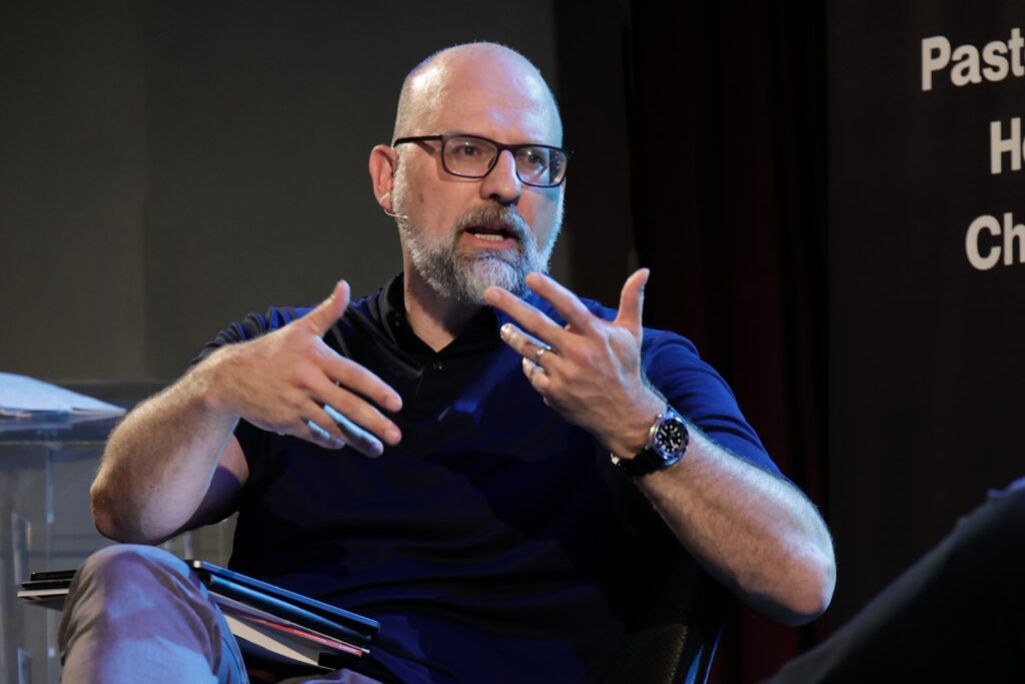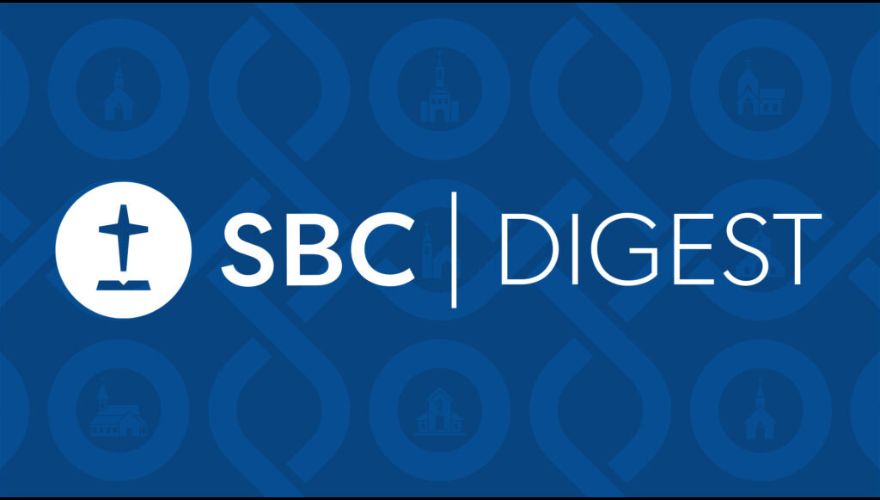
Jonathan Leeman, new president of 9Marks, discusses different philosophies of missions at the 9Marks at 9 event on June 9 at the Kay Bailey Hutchison Convention Center in Dallas.
DALLAS (BP) — Jonathan Leeman addressed the elephant in the room right away.
“If you’re here tonight because you want to know what 9Marks thinks of the (International Mission Board) IMB … I’m afraid we’re going to disappoint you,” said Leeman, president of 9Marks. “What we want to do tonight is to help you understand the principles at stake, so that you can evaluate various mission agencies that your churches might employ to do the work.”
He added, “We are all working for the same good ends and can be excited about that.”
The discussion centered on two basic paradigms that have captured the imagination of many evangelicals today: “movement-driven missions” and “church-centered missions.”
Movement-driven missions is “a cluster of missions strategies that will lead to a movement of rapidly multiplying believers and churches,” he said, noting the strategies represent a range of theologically healthy and unhealthy versions.
Relying on God’s activity, those more carefully theological will say “it is a set of techniques, which seek to produce the surprising activity of God, where great numbers of people come to Christ and new churches are started relatively quickly.”
Leeman noted there still is an emphasis on the “techniques,” such as discovery groups, in which, Leeman says, believers and unbelievers are not so much taught the Bible as they are trained to discover the Bible for themselves. “New believers are quickly taught to evangelize and teach others the Bible. And in some programs, even unbelievers are employed to teach the Bible.”
He continued, “Western missionaries take care not to make believers dependent on their teaching.” Instead, missionaries offer the first few lessons and then pull back, new believers are quickly promoted to leadership, and many of the small groups of believers can be designated as a church, he said. The entire process is replicated.
“When working with lost people, (these leaders are advised to) avoid falling into explaining the Scripture,” he said, explaining the premise that if they did, they run into the danger of being the authority, rather than the Scripture being the authority.
Leaders, therefore, become strategy coordinators or trainers. Leeman noted Warrick Farah in “Motus Dei: The Movement of God to Disciple the Nations” said, with this model, on average, it takes around 42 months to reach “movement stage,” defined as “more than 100 churches planted four or more generations deep.”
Noting each movement has its own methodology, Leeman offered two problems he has observed. One, “the need for speed indicates a reliance not on God, but on techniques … that are said to produce the activity of God.”
But, he cautioned, can God’s activity be produced? Can we schedule the Holy Spirit?
“The second you say, ‘speed’ or ‘this is how you multiply rapidly,’ you have put God on your timeline, and you have begun to rely on your techniques and not on Him,” Leeman said.
Second, when you rely on speed, you give away the “we’re relying on God” theology, which often results in a shallow or reductionistic view of “planting” or “watering,” which he fears leads to “cardboard cutouts of believers and churches and not something that is living and breathing and three dimensional.”
Pointing to 1 Corinthians 3:6, he said, sometimes God gives rapid growth, sometimes, slow growth and sometimes, no growth. “That’s the point, it relies on Him!” he said, stressing, “God does not promise fast,” referencing the “whole counsel of God” that Paul preached to the Ephesian church in Acts 20:27.
Quick discipleship doesn’t work for children or spiritual children, he said, pointing to the differences between the first and second Great Awakenings. The first relied on psychology, sociology and motivational speaking, he said. The second relied on God’s Word and His Spirit.
Leeman, pointed to the long and detailed work of the church, defined church-centered missions as “church planting across significant barriers such that churches are the means and ends of missions.” It’s church planting over there, he said.
Another definition, he said, is “missions involves sending qualified workers across linguistic, geographic, cultural barriers to start and strengthen churches, especially in places where Christ has not been named.”
He expounded on the four principles (“planks”) 9Marks teaches about church-centered missions:
First, “Christianity is church-shaped.”
The gospel doesn’t only promise God’s forgiveness to individuals, it also makes us a people, he said, pointing to 1 Peter 2:10 and Ephesians 2:1-10. “The local church is where we embody and live out the ‘we.’ … Following Jesus in discipleship means doing so in the context of the fellowship of His church.”
Second, “local churches are both the means and the ends of missions.”
“The most important missionary training doesn’t occur in a seminary or a missions agency training center,” he asserted, but in the years a person spends being a member in church, learning from elders how to be qualified, how to confess sin, be rebuked, submit and forgive. Once a person learns Christianity through the church, he can now take Christianity to someplace else and plant a church.
Churches are the biblical model and staging ground for missions, he said.
Third, “missions works best when churches work together.”
Leeman pointed to churches in the New Testament that pursued planting churches across barriers by working together.
“Churches should always aspire to cooperate,” he said.
Agencies, when involved, facilitate; they are aids, not ecclesial authorities, he said. Ecclesial authority belongs with each church choosing to partner with others.
Finally, “missions must be Bible-led.”
“Bibles are the best and only authoritative manual for the basics of missions,” he said. “It clearly establishes the necessary elements for a church, no matter the context.”
A panel discussion highlighting pros and cons of the two mission expressions by Nate Akin, executive director of the Pillar Network; Ryan Robertson, president of Reaching & Teaching, a missions agency that serves local churches; Ben Wright, pastor, Cedar Pointe Baptist Church in Cedar Park, Texas; and Mark Dever, president emeritus of 9Marks and senior pastor of Capitol Hill Baptist Church in Washington, D.C., followed Leeman’s presentation.
Attendees received copies of the book, “Prioritizing Missions in the Church,” written by Pastors Aaron Menikoff from Atlanta, Georgia, and Harshit Singh from Lucknow, India, who share their journeys leading missions-centered churches in two different settings.
On June 11, 9Marks also held a second session on “The State of the SBC.” Speakers included Dever, seminary presidents Albert Mohler and Danny Akin, and Pastor H.B. Charles.
(EDITOR’S NOTE — Shannon Baker is director of communications for the Baptist Resource Network (BRN) of Pennsylvania/South Jersey and editor of the Network’s weekly newsletter, BRN United.)


